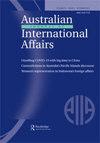China’s socialist market economy and systemic rivalry in the multilateral trade order
IF 1.8
3区 社会学
Q2 INTERNATIONAL RELATIONS
引用次数: 2
Abstract
ABSTRACT There is growing debate over whether China’s economic model can be managed within the rules of the multilateral trade system, a debate with major implications for international order. Critics argue that the China model is a systemic rival to the liberal trade order, a view that implies future decoupling. For those who reject the rivalry view, the default position is to propose more trade agreements with China, with the goal of driving liberal reforms in the country. This article engages the debate by contributing a conceptually informed and empirically supported analysis of China’s institutional development. Combining ‘second image’ insights with a comparative capitalism framework helps explain why nations evolve distinct varieties of market economy, which then shape their multilateral preferences. Applying these insights to China’s institutional development suggests two things: (1) the country is in transition to a socialist, rather than liberal, market economy, grounded in a fundamentally different legal and normative order; (2) the socialist market economy shapes Chinese preferences towards challenging the liberal trade order at a systemic level (i.e. over the rules of the game, rather than within them). Empirically, the article highlights two modes of systemic contestation by China that confirm the paper’s conceptual expectations.中国社会主义市场经济与多边贸易秩序中的系统性竞争
摘要关于中国的经济模式能否在多边贸易体系的规则范围内管理,人们的争论愈演愈烈,这场争论对国际秩序具有重大影响。批评者认为,中国模式是自由贸易秩序的系统性对手,这种观点意味着未来的脱钩。对于那些拒绝竞争观点的人来说,默认的立场是提出更多与中国的贸易协议,目的是推动中国的自由主义改革。本文对中国的制度发展进行了概念性分析和实证分析,从而引发了这场争论。将“第二形象”见解与比较资本主义框架相结合,有助于解释为什么各国会发展出不同的市场经济,从而形成其多边偏好。将这些见解应用于中国的制度发展表明了两件事:(1)中国正在向社会主义而非自由主义市场经济转型,其基础是一个根本不同的法律和规范秩序;(2) 社会主义市场经济塑造了中国人在系统层面挑战自由贸易秩序的偏好(即超越游戏规则,而不是在游戏规则内部)。从实证的角度来看,本文强调了中国的两种系统性争论模式,这两种模式证实了本文的概念预期。
本文章由计算机程序翻译,如有差异,请以英文原文为准。
求助全文
约1分钟内获得全文
求助全文
来源期刊

Australian Journal of International Affairs
INTERNATIONAL RELATIONS-
CiteScore
3.20
自引率
13.30%
发文量
44
期刊介绍:
AJIA is the journal of the Australian Institute of International Affairs. The Institute was established in 1933 as an independent and non-political body and its purpose is to stimulate interest in and understanding of international affairs among its members and the general public. The aim of the Australian Journal of International Affairs is to publish high quality scholarly research on international political, social, economic and legal issues, especially (but not exclusively) within the Asia-Pacific region. The journal publishes research articles, refereed review essays and commentary and provocation pieces. ''Articles'' are traditional scholarly articles. ‘Review essays’ use newly published books as the basis to thematically examine current events in International Relations. The journal also publishes commentaries and provocations which are high quality and engaging pieces of commentary, opinion and provocation in a variety of styles. The Australian Journal of International Affairs aims to analyse international issues for an Australian readership and to present Australian perspectives to readers in other countries. While seeking to stimulate interest in and understanding of international affairs, the journal does not seek to promote any particular policies or approaches. All suitable manuscripts submitted are sent to two referees in a full ''double blind'' refereeing process.
 求助内容:
求助内容: 应助结果提醒方式:
应助结果提醒方式:


